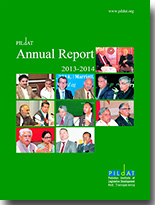PILDAT initiative on broadening and deepening public discourse on civilian and Parliamentary oversight on Defence continued during the reporting period. PILDAT highlighted the analysis of National Internal Security Policy (NISP) for the benefit of Parliamentarians, who have to engage not just in policy analysis but find effective means to oversee the implementation of the policy.
PILDAT worked closely with major political parties on developing well-defined defence and national security policies and to outline those in greater clarity and detail in their respective manifestoes. The PILDAT Dialogue Group on Civil- Military Relations approached the new Government to share reform proposals on effective democratic oversight on Defence and National Security.
PILDAT continued with its initiative of assessing democracy in Pakistan, which continued to receive media attention and coverage. PILDAT interacted with leadership of the country on the basis of findings of its evaluations to generate democratic reform.
In continuining with our initiative of facilitating regional Parliamentary Dialogues for sound bilateral and regional relations between Pakistan and its neighbouring countries, we facilitated 4 Parliamentary Exchanges during the period between Parliamentarians of Pakistan and Afghanistan in Kabul and Islamabad respectively while an Indian Parliamentary Delegation also visited Pakistan to engage in a dialogue with their Pakistani counterpartsto discuss way forward for improving Pakistan-India relations.
PILDAT has been advocating key reforms in the Electoral process for over a decade in Pakistan and we believe that Pakistan has made huge strides towards putting in place required Electoral Reforms ahead of May 2013 General Election. However, we at PILDAT believe that the less-than-satisfactory conduct of election on the polling day and the overall election management in general has once again pushed to the fore some major requirements for instituting electoral reforms in Pakistan. During the period, PILDAT reached to the Government, the ECP and other stakeholders advocating for a proposed Agenda on Electoral Reforms after the General Election. Some of the recommendations forwarded to the stakeholders included that the ECP should exercise Control, Superintendence and Discipline on Staff assigned for Election Duty, Better Training of Returning Officers & Polling Staff and Training of Polling Agents, monitoring and regulating spending by political parties during Election campaigns as well as increasing of Polling Stations &making those stations permanent, use of thumb impression to check bogus Voting, etc.
It was for the first time that in addition to using the IIDEA framework on assessing quality of democracy, PILDAT also created a Pakistan-Specific Framework toassess the quality of democracy in the first 100 days of the new Government – resulting in the score of 44.5%.
During the year, PILDAT was proud to continue our initiative of Youth Parliament Pakistan, moving on to launching the 6th batch. The Youth Parliament is a platform conceived, planned and implemented by PILDAT to inculcate in the youth the value of democracy and fact-based review and discourse on national policies on issues.
These initiatives and other modest contributions of PILDAT this year in strengthening democracy and democratic institutions in Pakistan are being shared with you through this report. PILDAT management and staff are united in pursuing our mission for strengthening democracy and democratic insitutions in Pakistan. We are focused on instituting non-partisan monitoring framework for the elected representatives and legislatures while facilitating greater participation of all segments of the society in the democratic process and development of new political leadership.
We place a high emphasis on learning lessons from all aspects of our work to help us develop stronger and more effective programmes and initiatives.








